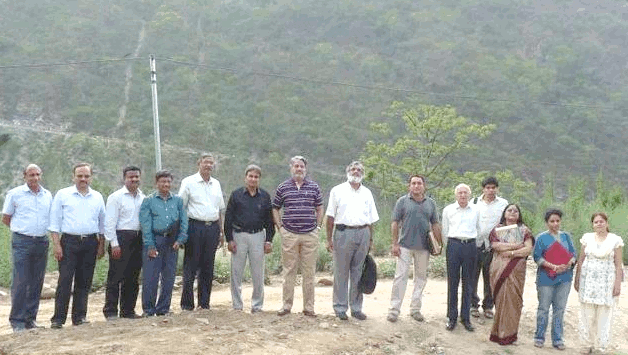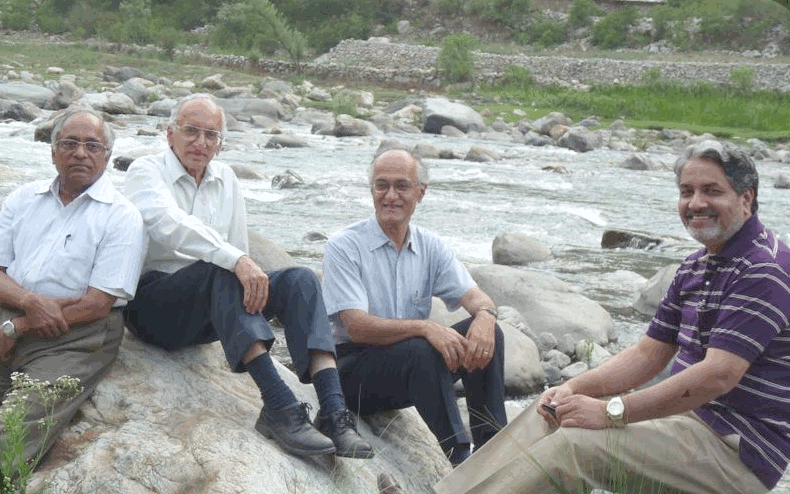NPTEL to expand education horizon, 10 July
The 12-member NPTEL Programme Implementation Committee (PIC) met at IIT Mandi on June 29, 2012. The participants discussed ways to enhance effectiveness of NPTEL’s free online courses which aim at improving the quality of engineering education in the country.
The Director, IIT Mandi, Prof. Timothy A. Gonsalves and four other faculty members of the institute were special invitees. In his welcome address, Prof. Gonsalves highlighted the significance of NPTEL in the education sector. He recalled that while he was at IIT Madras, he used to be sceptical about distance education and online teaching as compared to classroom teaching. But after coming to the relatively remote Mandi, he realised the vital role of online education. “Through online education, students can access experts in any area and can learn from them,” he said.
Prof Gonsalves listed various challenges faced while using online resources. First, despite good network facility, the network sometimes goes down from one or both ends. Second, it is difficult to schedule lectures simultaneously among students of different universities that follow different academic calendars and are in different time zones. Third, lectures need to be more interactive as students’ attention span shortens when they listen to lectures on their own. Prof. Gonsalves also favoured the introduction of a certification scheme in NPTEL on the basis of courses taken by students. In his inaugural address, Prof. R. K. Shevgaonkar, Director, IIT Delhi said, “Phases I and II of NPTEL were mostly about content creation. The third phase should concentrate on dissemination of courses and making it available to colleges.”
Dr. Bhaskar Ramamurthy said the number of viewers or readers who benefit from NPTEL is far more than other similar online education programmes. Recreating content through the banana-peel approach and good certification procedures would improve scalability. Akash tablets would also help in the spread of online education. Prof. M.S. Ananth pointed out that despite the challenges faced by this initiative, from delayed funding to time taken to coordinating with major universities to design the syllabus, the progress has been commendable. Also highlighted was the need to rope in more experts to create a wider knowledge base. Prof. Mangal Sunder Krishnan, IIT Madras, presented some interesting figures. The number of videos lectures on the NPTEL site has gone up from 3,198 in 2008 to 7,981 in 2012. Increased awareness and pedagogy training would definitely help this endeavour.
It was decided in the meeting to give certification to students taking three courses: Programming, Algorithms and Data Structures. The certification will be open for B.Tech. 3rd Yr. students and graduates in Sciences. The Ministry of Human Resource Development (MHRD) could build certification centres. And later, the certification can be extended to other courses that could eventually be run by a virtual university from NPTEL. A separate meeting of the IIT Directors (VCTEL) would be held soon and may be attended by the MHRD members for putting in place a mechanism for certification.
 |
The participants of the NPTEL Committee meet pose for a group photograph |
Currently, NPTEL is involved in higher education. Experts at the meeting suggested that NPTEL could play a fruitful role in high school education as well. IITs can now frame high school course guidelines for it. Topics from CBSE textbooks can be broken into problems and explained. Among those who attended the meeting were Prof. K.R. Srivathsan (IGNOU), Prof. Mangal Sunder Krishnan (IIT Madras), Prof. Bani Bhattacharya (IIT Kharagpur), Prof. K. Gopakumar (IISc Bangalore), Prof. Ashok Raichur (IISc Bangalore), Prof. Kushal Sen (IIT Delhi), Prof. Satyaki Roy (IIT Kanpur), Prof. Pradeep Yammivar (IIT Guwahati), Dr. Kandasamy (NITK Surathkal) and Dr. Ramesh (VTU).
The meeting ended with a vote of thanks to the host IIT Mandi. After high tea in a meadow in the scenic Uhl river valley, the committee members hiked down a steep forest path to cool off on the rocks in the Uhl.
 |